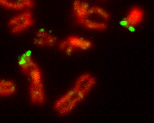擬常染色體區

擬常染色體區(英語:pseudoautosomal region),又稱擬常染色體區,是在高等動物性染色體(即X染色體和Y染色體)上的一段同源序列,分為PAR1和PAR2兩部分[1],擬常染色體區上已發現至少29個基因[2]。
擬常染色體區是X染色體和Y染色體間唯一可發生互換的位置,這也是它的名稱由來,由於會發生互換的是常染色體,X染色體和Y染色體一般是沒有互換的現象,只有在擬常染色體區反常地出現了互換,導致男性和女性都帶有兩個該區域基因的複本。這使擬常染色體區的基因表達類似常染色體,而非性染色體的性連鎖遺傳模式,因而得名[3][4]。
位置
[編輯]
| 名稱 | 染色體 | 起始位點 | 結束位點 | 帶[6] |
|---|---|---|---|---|
| PAR1 | X染色體 | 10,001 | 2,781,479 | Xp22 |
| Y染色體 | 10,001 | 2,781,479 | Yp11 | |
| PAR2 | X染色體 | 155,701,383 | 156,030,895 | Xq28 |
| Y染色體 | 56,887,903 | 57,217,415 | Yq12 |
擬常染色體區在GRCh37的位置是:
| 名稱 | 染色體 | 起始位點 | 結束位點 |
|---|---|---|---|
| PAR1 | X染色體 | 60,001 | 2,699,520 |
| Y染色體 | 10,001 | 2,649,520 | |
| PAR2 | X染色體 | 154,931,044 | 155,260,560 |
| Y染色體 | 59,034,050 | 59,363,566 |
功能與機制
[編輯]對一般X染色體上的基因而言,女性在兩個X染色體各有一個複本,男性則只有在唯一的X染色體上有基因,Y染色體的對應區域則沒有;而在Y染色體上的基因則只有男性擁有,女性因沒有Y染色體而沒有這些基因。但男性和女性都擁有兩個擬常染色體區基因的複本,男性是在X染色體與Y染色體分別有一個,女性則是在兩個X染色體各有一個,這種現象使擬常染色體區的基因遺傳、表現模式都和常染色體的基因相同,而不同於鄰近的性染色體基因。
基因
[編輯]
擬常染色體區共分PAR1和PAR2兩區塊,這兩個區塊被認為是獨立演化出來的[7]。目前共已發現29個基因。
PAR1
[編輯]以下是目前已發現在人類擬常染色體區PAR1區域的基因,共計16個。在老鼠基因體中,有些PAR1的轉基因到了常染色體[8]。
- ASMT,控制乙酰複合胺O-甲基轉移酶(Acetylserotonin O-methyltransferase),促進褪黑素生合成的酵素產生[9]。
- CSF2RA,控制粒細胞-巨噬細胞集落刺激因子(Granulocyte macrophage colony-stimulating factor)之受體的生成,與造血幹細胞的誘導分化有關[15]。
- PPP2R3B,可轉譯出一種蛋白磷酸酶(Protein phosphatase 2),該蛋白質為四種主要的絲氨酸-蘇氨酸磷酸酶(Ser/Thr phosphatases)之一,也和細胞成長的負回饋有關[21]。
PAR2
[編輯]以下是目前已發現在擬常染色體區PAR2區域的基因,共計3個,另有一個受關注的偽基因。
病理學
[編輯]X與Y染色體在擬常染色體區的基因互換和男性的減數分裂有所關聯,因此X與Y染色體配對錯誤的細胞無法完成減數分裂。擬常染色體區的基因突變或變性都會影響X與Y染色體的配對及互換,進而導致男性無法生育。
擬常染色體區上的基因都可以躲過X染色體去活化,也就是當X染色體被去活化成巴爾氏體後,其上擬常染色體區的基因仍可表現,這造成了XXY、XO、XXXY等性染色體數目異常者的劑量問題,使他們產生疾病[3]。例如PAR1區域的SHOX基因控制身體發育,XO的透納氏症患者缺少一個SHOX基因的複本,將導致其身材特別矮小。另外SHOX基因的缺陷也可能造成Léri-Weill軟骨骨生成障礙綜合症[27]及馬德隆畸形症(Madelung's deformity)等侏儒症。
參考文獻
[編輯]- ^ Helena Mangs A, Morris BJ. The Human Pseudoautosomal Region (PAR): Origin, Function and Future. Curr. Genomics. April 2007, 8 (2): 129–36. PMC 2435358
 . PMID 18660847. doi:10.2174/138920207780368141.
. PMID 18660847. doi:10.2174/138920207780368141.
- ^ Blaschke RJ, Rappold G. The pseudoautosomal regions, SHOX and disease. Curr Opin Genet Dev. 2006, 16 (3): 233–9. PMID 16650979. doi:10.1016/j.gde.2006.04.004.
- ^ 3.0 3.1 班布里基(David Bainbridge)著, 陳雅茜 譯. 《X染色體 命運的幕後黑手》. 天下文化出版社. 2004年10月. ISBN 986-417-380-4 (中文(臺灣)).
- ^ 4.0 4.1 Ciccodicola A, D'Esposito M, Esposito T; et al. Differentially regulated and evolved genes in the fully sequenced Xq/Yq pseudoautosomal region. Hum. Mol. Genet. February 2000, 9 (3): 395–401 [2011-02-18]. PMID 10655549. doi:10.1093/hmg/9.3.395. (原始內容存檔於2019-09-15).
- ^ Genome Reference Consortium. Human genome overview GRCh38.p10. 2017-01-06 [2017-05-10]. (原始內容存檔於2016-10-09).
- ^ Pseudoautosomal regions Gene Family. HUGO Gene Nomenclature Committee. [2017-05-11]. (原始內容存檔於2017-07-11).
- ^ Charchar FJ, Svartman M, El-Mogharbel N; et al. Complex events in the evolution of the human pseudoautosomal region 2 (PAR2). Genome Res. February 2003, 13 (2): 281–6 [2011-02-18]. PMC 420362
 . PMID 12566406. doi:10.1101/gr.390503. (原始內容存檔於2019-09-15).
. PMID 12566406. doi:10.1101/gr.390503. (原始內容存檔於2019-09-15).
- ^ Levy MA, Fernandes AD, Tremblay DC, Seah C, Bérubé NG. The SWI/SNF protein ATRX co-regulates pseudoautosomal genes that have translocated to autosomes in the mouse genome. BMC Genomics. 2008, 9: 468 [2011-02-18]. PMC 2577121
 . PMID 18842153. doi:10.1186/1471-2164-9-468. (原始內容存檔於2011-05-25).
. PMID 18842153. doi:10.1186/1471-2164-9-468. (原始內容存檔於2011-05-25).
- ^ Rodriguez IR, Mazuruk K, Schoen TJ, Chader GJ. Structural analysis of the human hydroxyindole-O-methyltransferase gene. Presence of two distinct promoters. J. Biol. Chem. December 1994, 269 (50): 31969–77 [2011-02-18]. PMID 7989373. (原始內容存檔於2003-10-04).
- ^ Ried K, Rao E, Schiebel K, Rappold GA. Gene duplications as a recurrent theme in the evolution of the human pseudoautosomal region 1: isolation of the gene ASMTL. Hum Mol Genet. Dec 1998, 7 (11): 1771–8. PMID 9736779. doi:10.1093/hmg/7.11.1771.
- ^ Bernard G, Raimondi V, Alberti I, Pourtein M, Widjenes J, Ticchioni M, Bernard A. CD99 (E2) up-regulates alpha4beta1-dependent T cell adhesion to inflamed vascular endothelium under flow conditions. European journal of immunology. October 2000, 30 (10): 3061–5. PMID 11069091. doi:10.1002/1521-4141(200010)30:10<3061::AID-IMMU3061>3.0.CO;2-M.
- ^ Bernard G, Breittmayer JP, de Matteis M, Trampont P, Hofman P, Senik A, Bernard A. Apoptosis of immature thymocytes mediated by E2/CD99. Journal of immunology (Baltimore, Md. : 1950). March 1997, 158 (6): 2543–50. PMID 9058785.
- ^ Oh KI, Kim BK, Ban YL, Choi EY, Jung KC, Lee IS, Park SH. CD99 activates T cells via a costimulatory function that promotes raft association of TCR complex and tyrosine phosphorylation of TCR zeta. Experimental & molecular medicine. April 2007, 39 (2): 176–84 [2011年2月18日]. PMID 17464179. (原始內容存檔於2011年7月26日).
- ^ Entrez Gene: CRLF2 cytokine receptor-like factor 2.
- ^ Nicola NA, Metcalf D. Binding of 125I-labeled granulocyte colony-stimulating factor to normal murine hemopoietic cells. J. Cell. Physiol. 1985, 124 (2): 313–21. PMID 3876343. doi:10.1002/jcp.1041240222.
- ^ Persson B, Kallberg Y, Bray JE, Bruford E, Dellaporta SL, Favia AD, Duarte RG, Jörnvall H, Kavanagh KL, Kedishvili N, Kisiela M, Maser E, Mindnich R, Orchard S, Penning TM, Thornton JM, Adamski J, Oppermann U. The SDR (short-chain dehydrogenase/reductase and related enzymes) nomenclature initiative. Chem. Biol. Interact. November 2008, 178 (1-3): 94–8. PMC 2896744
 . PMID 19027726. doi:10.1016/j.cbi.2008.10.040.
. PMID 19027726. doi:10.1016/j.cbi.2008.10.040.
- ^ Vawter MP, Harvey PD, DeLisi LE. Dysregulation of X-linked gene expression in Klinefelter's syndrome and association with verbal cognition. Am. J. Med. Genet. B Neuropsychiatr. Genet. September 2007, 144B (6): 728–34. PMC 2094046
 . PMID 17347996. doi:10.1002/ajmg.b.30454.
. PMID 17347996. doi:10.1002/ajmg.b.30454.
- ^ Stomski, F C; Sun Q, Bagley C J, Woodcock J, Goodall G, Andrews R K, Berndt M C, Lopez A F. Human interleukin-3 (IL-3) induces disulfide-linked IL-3 receptor alpha- and beta-chain heterodimerization, which is required for receptor activation but not high-affinity binding. Mol. Cell. Biol. (UNITED STATES). Jun 1996, 16 (6): 3035–46. ISSN 0270-7306. PMC 231298
 . PMID 8649415.
. PMID 8649415.
- ^ Entrez Gene: P2RY8 purinergic receptor P2Y, G-protein coupled, 8.
- ^ Skaletsky H, Kuroda-Kawaguchi T, Minx PJ; et al. The male-specific region of the human Y chromosome is a mosaic of discrete sequence classes. Nature. June 2003, 423 (6942): 825–37. PMID 12815422. doi:10.1038/nature01722.
- ^ Entrez Gene: PPP2R3B protein phosphatase 2 (formerly 2A), regulatory subunit B, beta.
- ^ SHOX - short stature homeobox - Genetics Home Reference. U.S. National Library of Medicine. [2008-02-18 date = 2005-09-01]. (原始內容存檔於2007-10-12).
- ^ Palmieri F. The mitochondrial transporter family (SLC25): physiological and pathological implications. Pflugers Arch. February 2004, 447 (5): 689–709. PMID 14598172. doi:10.1007/s00424-003-1099-7.
- ^ Tippett P, Ellis NA. The Xg blood group system: a review. Transfus Med Rev. October 1998, 12 (4): 233–57 [2011-02-18]. PMID 9798268. doi:10.1016/S0887-7963(98)80001-1. (原始內容存檔於2020-07-28).
- ^ Mann JJ, Cahan A, Gelb AG, et al. A sex-linked blood group. Lancet. 1962;i:8.
- ^ WASH6P. [2009-01-05]. (原始內容存檔於2012-10-24).
- ^ Renata de Lima1; Cristina Forti Iamada; Luciana Oliveira Silva; Maricilda Palandi de Mello; Andréa Trevas Maciel-Guerra. An illustrative case of Léri-Weill dyschondrosteosis. Centro de Biologia Molecular e Engenharia Genética, Universidade Estadual de Campinas, Campinas, SP, Brazil; Departamento de Genética Médica, Faculdade de Ciências Médicas, Universidade Estadual de Campinas, Campinas, SP, Brazil; Departamento de Pediatria, Faculdade de Ciências Médicas, Universidade Estadual de Campinas, Campinas, SP, Brazil. 2008-11-19 [2011-02-18]. ISSN 1415-4757. doi:10.1590/S1415-47572008005000017. (原始內容存檔於2017-12-02) (英語).
